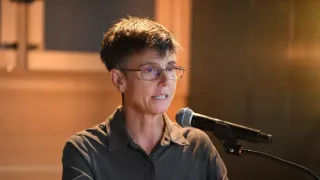
4 hours ago
Anti-LGBTQ+ Candace Owens Barred from Australia: High Court Upholds Ban Over Fears of Incitement
READ TIME: 3 MIN.
Australia’s High Court has delivered a decisive verdict: conservative commentator Candace Owens will not be allowed to enter the country. The unanimous ruling, handed down on October 16, 2025, affirms the government’s earlier decision to bar Owens from a national speaking tour, citing fears that her presence and public statements could incite hostility or even violent action against minority groups—particularly LGBTQ+ communities .
The case centered on a 2024 decision by Home Affairs Minister Tony Burke, who invoked powers under the Migration Act to refuse Owens a visa after she failed Australia’s “character test.” According to court documents reviewed by the Associated Press, officials cited Owens’ history of inflammatory and extremist remarks targeting Muslim, Black, Jewish, and LGBTQIA+ communities. The government concluded that permitting her entry would be contrary to the national interest, especially given Australia’s recently elevated terrorism threat level .
Minister Burke stated, “Inciting discord might be the way some people make money, but it is not welcome in Australia.” He further clarified that the decision was motivated by the potential for Owens’ rhetoric to foster radicalization or violent action, particularly against vulnerable populations such as transgender people, gay men, lesbians, and other LGBTQ+ individuals .
Owens responded to the ban by mounting a legal challenge, arguing that the government’s use of the character test was an overreach of power that threatened freedom of political communication. Her legal team claimed that such discretion could be used to silence any viewpoint the minister found objectionable. However, the High Court did not accept Owens’ arguments. All three judges ruled that the government had acted lawfully and did not misuse its authority in applying the Migration Act. Owens was also ordered to pay the government’s legal costs .
The ruling emphasized that while Australia respects robust political debate, it draws a clear line at speech that promotes hatred or could incite violence. The court’s decision sends a strong message that the nation will not tolerate rhetoric deemed a threat to public order or safety, particularly when it targets marginalized groups .
Australia has previously used its Migration Act character test to bar high-profile figures whose conduct was considered contrary to public interest. In recent years, officials revoked a visa from Ye (formerly known as Kanye West) after he released music praising Adolf Hitler, citing similar concerns over public safety and the risk of radicalization. The law provides the government broad discretion in blocking individuals seen as threats to community harmony or security .
The decision has been welcomed by numerous LGBTQ+ advocacy organizations in Australia, who view the move as an affirmation of the country’s commitment to protecting minority communities from hate speech and potential violence. In recent years, Australia has made legislative progress on LGBTQ+ rights, including marriage equality and anti-discrimination protections. However, advocates warn that public rhetoric from influential figures can still fuel harassment and social exclusion, particularly affecting transgender people and others at heightened risk .
Community leaders have noted that the government’s action aligns with efforts to foster an inclusive society, free from incitement and hostility. Many point to research indicating a link between anti-LGBTQ+ rhetoric and increased rates of harassment or violence against LGBTQ+ individuals, underscoring the importance of proactive measures to safeguard public spaces and events .
Candace Owens has announced her intention to respond on social media, but for now her planned tour—which included stops in neighboring New Zealand—is officially canceled. The outcome of her case is likely to have ripple effects for other public figures seeking to enter Australia, especially those whose statements have been deemed extremist or divisive .
International observers note that the ruling may set a precedent for other democratic nations grappling with the balance between freedom of expression and the need to protect minority groups from incitement and harm. Australia’s stance reflects a growing trend among governments to use immigration policy as a tool for maintaining public safety and reinforcing social values, particularly in the wake of rising global concerns about hate speech and radicalization .
Australia’s decision to bar Candace Owens underscores its commitment to preventing incitement and protecting LGBTQ+ and other minority communities from speech that could lead to violence or social discord. The High Court’s ruling marks a clear boundary for those seeking to use the country’s platforms to spread divisive rhetoric, reinforcing the principle that robust debate must not come at the expense of public safety or inclusion .






